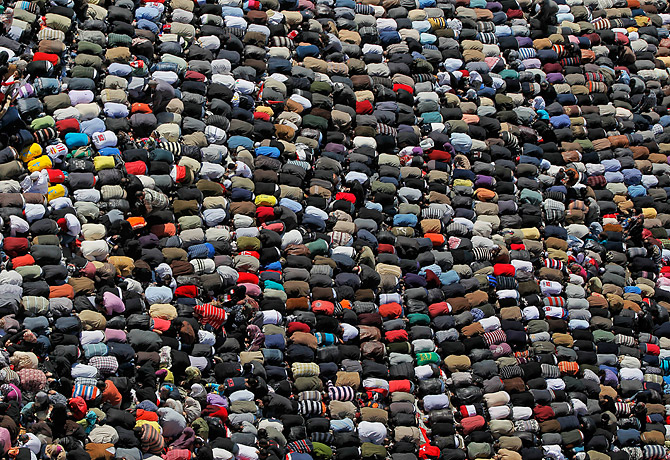
Tens of thousands of Egyptians gather during celebrations of Hosni Mubarak's fall from power to pray — and to maintain pressure on the current military rulers — in Tahrir Square in Cairo on Feb. 18, 2011
(2 of 2)
"You have such a romantic view," Ibrahim says, leaning back into a well-worn brown leather armchair in Ahmed's office. "I'm not talking about people who skip bail and go overseas. There are guys who escaped from prison recently, we know where they are but we can't go and get them because they will kill us if we try. That's the type of person I'm talking about. Wouldn't he do the same thing if he was let out on bail?
Some 23,000 prisoners escaped from jails in the early days of the rebellion, in still-murky circumstances. According to the Interior Ministry, which controls the police force, about 10,000 have been recaptured. Ibrahim says that scrapping the emergency law will make it harder to round up the remainder. "You should tell your friends that," he says.
"The problem is they don't trust you, they don't trust the uniform," says Ahmed, an entrepreneur who manages his family's varied business interests.
"That's not fair, we're not all bad. What percentage of the officer corps do you think is rotten?" Ibrahim asks, cognizant that a journalist is listening to their conversation.
"80%, but I'm not including you."
"That's too high. That's way too high," the officer says, arguing that the ballot stuffers and thugs, or baltagiya as they are called in Egypt, were controlled by Mubarak's ruling party, the National Democratic Party, not the security forces, although he admits they did coordinate efforts. "It's not our fault, it's the system."
That "system" made the police force, both uniformed and plainclothes, the much-feared muscle propping up Mubarak's tyrannical regime. The former president was quick to sacrifice Habib al-Adli, his long-time interior minister, in the early days of the protest in a bid to assuage popular anger, but it wasn't enough. Adli is now in jail, under investigation for corruption.
Adli's successor, Mahmoud Wagdy, is trying to rehabilitate a much-despised police apparatus. According to local media reports, he wants to retrain the force in the proper treatment of civilians and detainees, and increase pay to discourage extortion. "The minister told us that we have to treat the people well during this period," Ibrahim says, retelling the details of a recent meeting a group of officers held with Wagdy at the Interior Ministry.
"The problem is the senior officers," says Ibrahim. "I don't have time to be a psychologist and to figure out how to get information from a suspect. I have superiors on the phone asking for information and results."
"That's not an excuse," Ahmed says.
"So what am I supposed to do? I have case quotas I have to meet. I'm asked to have X number of weapons cases, drugs cases. I have to meet those or I'm in trouble. We raised this with Wagdy. He says he won't set quotas from now on. We'll see."
"Yeah, everybody knows about your quotas," Ahmed says. "People joke that at the end of the year, they should stay home because the police are on the streets, trying to fill their quotas."
Both men laugh. After a while, Ibrahim turns to another subject. "You know, Hosni Mubarak deserved better than this, to be removed like this. We didn't have war for 30 years thanks to him," he says.
"Yes, but did you live in dignity?" Ahmed counters, not missing a beat.
"He's better than the alternatives, than Ayman Nour [head of the El Ghad party] or [former International Atomic Energy Agency chief Mohammed] Elbaradei. What is Elbaradei? He hasn't even lived here," Ibrahim says, referring to two opposition leaders and potential presidential candidates. (ElBaradei resides in Europe.)
"And you and your Facebook," he continues. "Embarrassing the country in a way that even people overseas could see. That is shameful."
Ahmed just smiles and shakes his head.